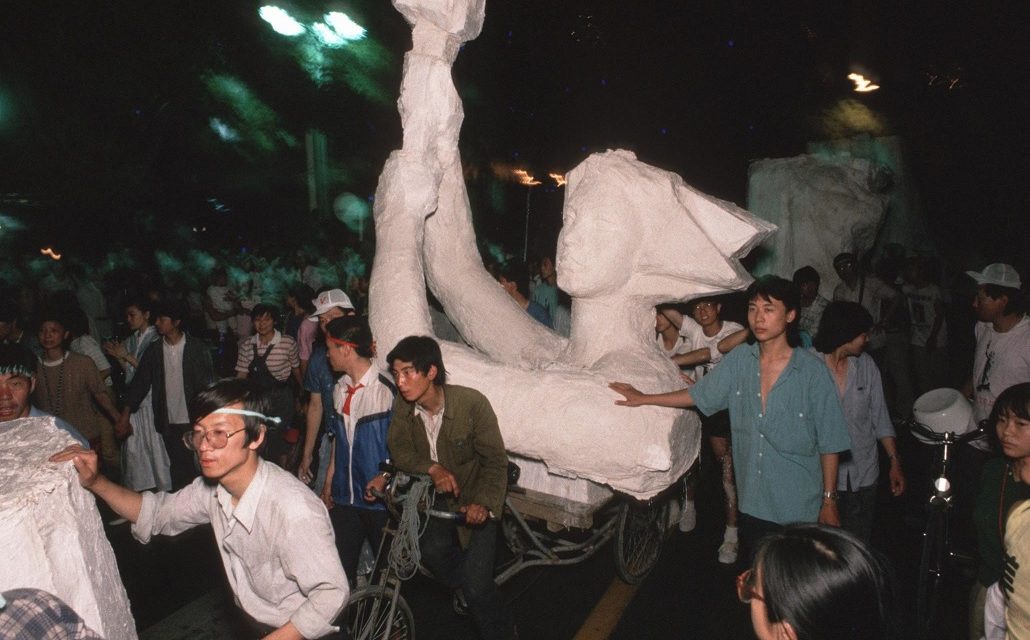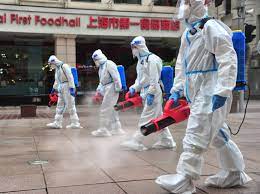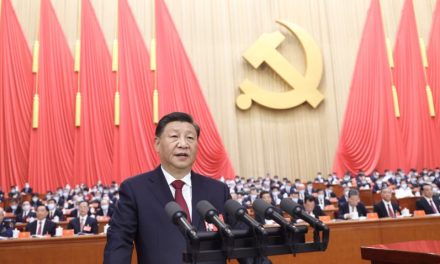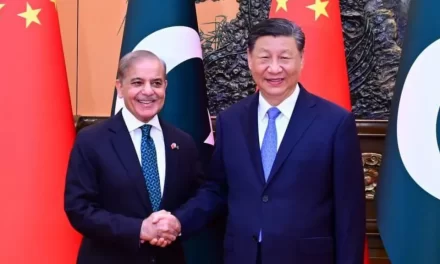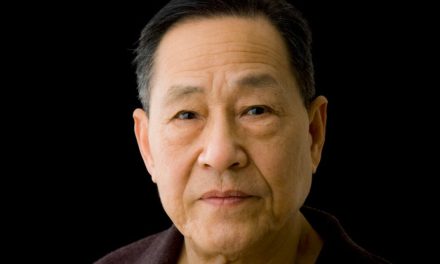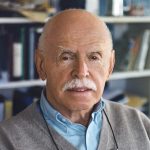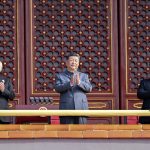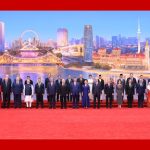By Zhou Duo
Apr 14, 2024
Editor’s note: What follows is the author’s remarks on his experience after joining the 1989 protest movement in Beijing. Some details are widely known, others not, and the author here is a man with blunt views at and about a time when meetings could be organized, petitions could be signed and dissidents knowing they would be arrested flew back to China anyway, things that seem unimaginable in today’s totalitarian, surveillance-state China.
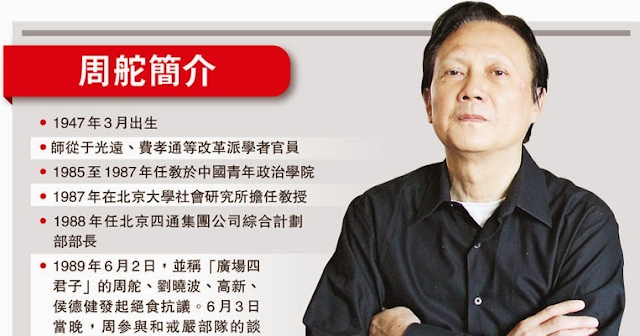
(Translation of remarks in image)
Zhou Duo, a brief biography
Born: March, 1947
Studied under Guang Yuan, Fei Xiaotong and other reform-minded scholars
1985-1987: professor, China Youth University of Political Studies
1987: professor, Center for Social Research, Peking University
1988: Comprehensive Planning Department, Sitong Group Company
June 2, 1989: Along with Liu Xiaobo, Gao Xin, Hou Debian, all members of the so-called “Four Gentlemen of Tianmen Square,” announced a hunger strike.
“The Truth about the Clearance of Tiananmen Square” were remarks given on May 28. In today’s remarks I would like to start from April and discuss prior events.
The events culminating in June 4 were triggered by the death of Hu Yaobang on April 15, 1989. Ultra-left, anti-reform forces within the Chinese Communist Party had seized on the student uprising at the end of 1986 as an excuse to remove Hu from power. Therefore, college students felt a deep bond with the former general secretary, and launched another student movement now. Between April 20th and 23rd (I forget the exact date, my diary was secretly destroyed at a checkpoint on the way to Yantai on June 14th), I took my assistant from the Sitong Company to Peking University. There in its Department of Sociology I found Wang Hansheng, a former colleague, and talked with several Peking University students. I first wanted to understand what was going on, and also wanted to provide them with some reference opinions. One of the graduate students, Yan Yong, asked why the senior students did not take the lead, but instead watched freshmen and sophomores do so. He said, “We were at the forefront at first, but we soon discovered that whoever was moderate stepped down and was replaced by radicals, and the radicals were replaced by more radical ones. What do you think we can do?” Two months after the events, while detained in the Changping Insurance Company Guesthouse. I secretly entrusted the policeman who was guarding me to buy on my behalf Huntington’s famous book “Political Order in a Changing Society.” It said that student movements around the world are the most radical political force. The government will oppose them; but from an objective point of view, when the government is dominated by conservative or reactionary forces, the student movement can usually promote social progress; but when the government is dominated by reformists, the student movement is paradoxically usually a hindrance and only helps the conservatives. A reformist government is thus often forced to step down. Later facts proved that this was indeed the case. Someone once asked Hu Ping, a veteran pro-democracy activist, why student movements always end in failure. He replied, it’s very simple: if a government doesn’t fall outright, it won’t end! I recommend everyone to read my “Book Report No. 23 – Russia’s Unfinished Revolution.” It discusses moderate reformists inside and outside the system. For such reformists to form a political alliance and occupy the mainstream is an important condition for the success of democratic transition. But on the contrary, as long as one faction is dominated by extremists — whether ultra-conservative or ultra-radical — democratic transition will be much more difficult. And this is why I have always advocated forming a center-left and center-right alliance.
In short, on the one hand, I was definitely on the side of the students politically and emotionally. But on the other, I had a lingering, ominous premonition from the beginning, and was worried that this student uprising would despite good intentions lead instead to bad outcomes. And such a movement did in fact backfire and bring down Zhao Ziyang’s reformist government. And this was exactly the fear that was the fundamental reason why I was deeply involved in the 1989 student unrest.
On April 24, around three o’clock in the morning, I was drifting off to sleep when I heard the phone ringing non-stop. I stumbled out of the living room and grabbed the receiver — it turned out to be Liu Xiaobo calling from New York, USA. As soon as you hear his stammering, you know it’s him. I only have one friend who stutters.
I first met Liu Xiaobo in February 1988. At that time, I was still at the Institute of Sociology of Peking University and had not yet joined the Sitong Company, but I had been working as a consultant to Sitong General Manager Wan Runnan for nearly a year. At that time, Sitong contracted with a state-owned factory, Yunnan Electronic Equipment Factory. Because the corporate cultures of the state-owned enterprise and Sitong were incompatible, Wan Runnan wanted to set up a “Sitong Management Cadre Academy” in Kunming to train a variety of middle-level cadres. The first training class of the college was held in Kunming, and more than 30 middle-level cadres from Sitong had to fly from Beijing to Kunming within five days for training. I was roped in to be the teaching director for the second half of the semester, setting up courses and hiring teachers. One of them was Liu Xiaobo, an aesthetics (in the philosophy sense) teacher whom I hired. It was because of this Sitong Management Cadre Academy that I met Liu Xiaobo. Later, I became his best friend. He repeatedly said that were it not for this management school, he would never have known me. He said that no matter how the students at Sitong evaluated his lectures, this trip to Kunming was worth it for this reason alone. After listening to these words, I was very moved.
Just like all his lectures, Liu Xiaobo’s lectures at Sitong were sensational. It was really an eye-opener for us Sitong people. Some were angry, some were frightened, and it goes without saying that some were applauding very enthusiastically — and of course those applauding were in the minority. No matter what, it was much more exciting than the economics I taught. I listened to one of his lectures. I was stunned that his stuttering mouth could be so eloquent. If you have never listened to his lectures, it would be hard to imagine how they could be so exciting when he usually stutters so badly and speaks with a Northeastern accent. What a peculiar thing.
However, I did not agree with many of his views. Let’s just say he was a hopeless bigot, and I don’t see the point in bigotry, which I feel is ugly. Other examples are his national nihilism, and his contempt for the masses. His Nietzschean anti-humanism. He goes to extremes. What is particularly radical is his libertarianism, sometimes called liberalism, libertarianism, extreme liberalism, etc. In short, it advocates French-style freedom without any constraints, including moral and legal constraints. It is completely different from the British-style conservative liberalism that I believe in, freedom based on the rule of law, constitutional government, and Christian ethics, which is what Hayek called the “liberal order.”
I must admit, I have never met someone who gives me emotions as complicated as those Liu Xiaobo created in me. As old friend and writer Ma Jian (the one who wrote “Show Your Tongue”) said, “You and Liu Xiaobo are simply not in the same space.”
One could see at first glance that Liu Xiaobo was a wild and untamable person. You would not think that his father was a professor. He didn’t look like someone from an intellectual family. He was full of wild spirit, and from childhood loved to fight and cause trouble, which was very different from me. I had almost never been in a fight, but strangely enough, I hated those good kids from upper-class intellectual families. Similar to their fathers whose spines were broken by the Communist Party, theirs too were all made of noodles. The word “righteousness” never entered their minds. If there was any disturbance, they would be so scared that they would wet themselves. Since childhood I never liked playing with them. I would rather get slapped afterward by my father just to hang out with the wild kids. I don’t want to say that my parents were role models, but rebellion was not allowed in our family. My father was a liberal, but my mother was extremely strict. As children we were not particularly sensible or well-behaved, but there were certain lines we were absolutely not allowed to cross. This was not the case with Liu Xiaobo. In addition to being good at homework, he could be counted on to give the teacher a splitting headache when he saw him, and was a born rebellious leader. Wherever he went, there was a lot of chaos.
Of course, Liu Xiaobo was very intelligent. One of the things I cherish most in life is smart people, both male and female. The biggest pain in being a Chinese intellectual is not being poor or not having freedom, but being forced to argue about the most boring issues with many people with third-rate or lower IQs.
But I didn’t understand how Xiaobo allowed people to get away with so many excuses. After listening to his lecture in Kunming, I shook my head and said, “You are too cruel. First of all, there are few people in the world who can really bear the full weight of the truth. People are almost all big babies. You have to coax them, lie to them, and give them sweets to eat. There is no need for you to tell them the cold verities of life. It is like telling a group of the disabled that if a person cannot be a 100-meter sprint champion, his life is not worth living. It’s not fair. They are simply not destined to be sprint champions. You can’t send them away crestfallen. You are depriving them of hope, beating them, humiliating them. You say these things to the wrong people. They should not be said to the broad masses of the people who will never be able to get close to excellence. Secondly, you are anti-traditional and you admire modern Western civilization, but you have lost the core of modern Western civilization — humanism. You are so vicious. Nietzsche was smart, but he was too cruel. It’s an anemia, emotional anemia. Your theory is contradictory.”
Out of a rare courtesy, Liu Xiaobo once admitted that I was right. He said he never wanted to hide his contradictions. I shook my head and said nothing more. I have to say that Liu Xiaobo was sincere, upright, and hated evil and hypocrisy. He always talked about himself in the worst possible light and never give himself any credit. I have to admit, he was better than I in these areas. I admit that I am weak. In addition, I cannot help but be hypocritical because I love art. Classical art, in addition to its elegant taste, is inevitably full of aristocratic pretentiousness. I hate modernists and those psychopaths who make a career out of picking up garbage once it is exposed to the sun. In my opinion, if a person has done something scandalous, it is best to hide it in his pockets and not let me know anything about it. Talking to me about these disgusting scandals will not whet my appetite and thus lead me to eat an extra bowl of rice at noon, nor will it make me like him more, nor will it increase my knowledge. I’ve known for a long time what it is like to be human — there’s a devil in everyone’s heart, this I’ve known since I was a child. You can criticize and say, your so-called classicism is, in a word, self-deception. You deceive yourself first, preparatory to deceiving others. But people need this. The most intelligent people can only be nihilists. Nihilists should commit suicide. Nihilists who do not commit suicide must be insincere. While saying that the world is a living hell and human beings are crap, yet while still living with relish, such people must be out-and-out hypocrites. I would rather see people pretending to worship Beethoven and Chopin — even if they didn’t listen to a single note — than watch them twisting their ugly fat butts and doing some swing dance. Human beings need to decorate their lives with the masquerade of civilization, education, and art. At the same time, they need to keep a certain distance between themselves and other people. Otherwise, there is no way to avoid endless vicious battles among a large community composed of so many individuals, and a society thus constituted would completely collapse and disintegrate.
Liu Xiaobo’s major had been aesthetics, and aesthetics was exactly what I wanted to do back then. When I was taking the postgraduate entrance examination, I never thought about doing “research on Marxism-Leninism and Mao Zedong Thought.” At that time, I already hated Marxism-Leninism, and all I wanted to do was aesthetics. The reason was simple: I am most interested in two things, philosophy and art, and aesthetics is just the combination of the two — aesthetics is philosophical thinking, with art as the object. Unfortunately, the year I applied for graduate school, 1979, there was no supervisor recruiting graduate students in aesthetics. I had decided to give up on taking the exam again the next year. However, my middle school classmate Wang He persuaded me to take another course and give it a try. He said that the policies of the Communist Party are subject to change. I wonder if a veteran like me — an educated youth who wanted to cut in line — would be able to skip four levels and directly take the postgraduate entrance examination in another year. I though that this reasoning made sense. Back then, unlike now, the door of opportunity was very narrow, and I had already lost one opportunity and was not admitted to college. It wasn’t because my score wasn’t high enough, it was more than 40 points higher than the admission limit. It was because the Peking University Family Committee, a “grassroots political organization” that was in control after I returned to Beijing due to illness, stuffed a lot of black materials into my file. There were five major crimes in total — including “frequently gathering unscrupulous people at home to eavesdrop on bourgeois pornographic music,” and “disobeying assignments.” I was assigned to go to the Haidian Soy Sauce Factory to make soy sauce pickles, but I firmly refused. I was desperate at that time, working as a substitute teacher in a middle school. I could not become a regular worker and could only work as a temporary one because the national policy at the time was that educated youth who retired due to illness could only work in collective-owned units.
In 1979, there were only two majors for graduate students that I could apply for: “Modern Western Philosophy,” at the Institute of Philosophy of the Chinese Academy of Social Sciences, and “Marxist-Leninist-Maoist Studies,” with Mr. Yu Guangyuan. But I had studied Russian, when what I needed for philosophy were English and German. So I had no choice. I studied hard for forty days and rushed out a paper, but still I actually passed the exam. It was really baffling. From then on, I learned that things in China are very “unique” and cannot be inferred based on common sense.
I felt sorry to say goodbye to aesthetics at the time, but I don’t regret it now. Being able to study for three years under a first-class tutor like Yu Guangyuan has always been a great blessing in my life.
I can’t count the number of people who called me “aristocratic” and said that I was “proud of my blood.” They said that I “was born in the wrong place and should not have been born in China.” (Liu Xiaobo said that I “should have been born into a British aristocratic family.”). And so on along these lines. To be accused of being aristocratic and separated from the masses, this is a big scary thing in China. Maybe not just in China, maybe people throughout the world fear this label. But what I want to say now is, is gentrification really that bad, so outdated and reactionary? Is “civilianization” and popularization really that good, so in line with the trend of the times, and so progressive? Maybe Western democracy has gone astray and become more and more populist? This major question has been discussed in my own “Discussing Democracy.”
And Liu Xiaobo at one point asked me on the phone if I would like to send on an “Open Letter to Chinese College Students” written by several people for the students. I thought to myself, what could be wrong with that? It’s an open letter, not an atomic bomb. He, Hu Ping, Jiang He, Chen Jun, and others, ten in total, wanted to support and guide this great patriotic democratic student movement. I gave him the telex number of the Sitong Company and made an appointment to receive his telex at nine o’clock sharp the next morning. At that time, this open letter, which the government later depicted as supernatural, was punctually delivered. When I saw it, I was quite disapproving. It wouldn’t do anything, I thought. However, since I had promised my friend, I had no choice but to send it along. I had no idea where the students’ redoubt was, so I made some random inquiries on the Peking University campus, and after a lot of effort, I found their “Linchao” headquarters in the 27th corner on campus. The entrance to the facility was heavily guarded, reminding me of Smolny Palace in the movie “Lenin in October.” I said, “I want to see your Lenin.” Lenin was not there, so it was probably Sverdlov whom I saw. I gave them the “open letter.” When they saw Hu Ping’s name on it, they immediately looked embarrassed, obviously unwilling to get involved — I was never embarrassed to tell Liu Xiaobo about this. After a quick conversation, I said goodbye to this Sverdlov and returned to the company to work as usual.
Later, this unfortunate open letter that caused so much trouble was said to have been posted somewhere in the Peking University Triangle, and it became the number one piece of evidence that the authorities used to make a fuss about so-called “overseas reactionary forces meddling in the student unrest.” In fact, it was just an ordinary thing written by Xiaobo on impulse, and he asked a few personal friends around him to help write it. It did not have any effect on the student movement. People who have not dealt directly with students almost always underestimate the extent to which students are self-righteous — they think this is called “independence.” In addition, this letter had no organizational connection with the Democratic League. Hu Ping, chairman of the Democratic League, signed it in his personal capacity. I don’t understand why the officials hated Hu Ping so much. As far as I know, Hu Ping actually joined the Democratic League in order to change its extreme and emotional tendencies and adopt instead a stance of persuasion of and dialogue with the Communist Party.
Who would have thought that after writing this open letter with Hu Ping that Xiaobo would dare to return to China? He had already received a letter of appointment from Columbia University in the United States, asking him to teach for one year. Everyone advised him not to come back. Hu Ping and Chen Jun agreed that he was likely to be arrested. They probably didn’t realize that Xiaobo was addicted to jail. It is said, “There is no reform in either ancient or modern times that has been successful without bloodshed. If there is to be bleeding, please start with your own heirs.” (This is the general idea, I can’t remember clearly). What Liu Xiaobo thought was, “If people must go to jail, please start with Liu Xiaobo.” Of course he never admitted it himself. He only told me that America was too boring and not a place for him to pursue a career. The CCP scolded him for being unpatriotic. If someone like Liu Xiaobo’s dedication and spirit of standing up at critical moments is “unpatriotic,” I don’t know what “patriotism” is.
Xiaobo’s wife was frightened to death when she received a call from him saying that he was returning to China. She and Ye Yanhong, a vice president of Sitong, came to me angrily and said that they must find a few reporters and work with me to find a way to pick up Liu Xiaobo inside the airport—preferably right next to the ramp of the plane—in case “something happens,” in case “he just disappears after getting off the plane.” I thought their fears were a little silly, even a bit crazy. But I still put on a serious face, lest they accuse me of being cold and unreasonable. I made dozens of phone calls to find those Chinese and foreign reporters. But when you really want something from such people, you can’t find any of them.
At the airport the reporters didn’t find her, but she got in somehow. It took a lot of effort and a lot of help. According to regulations, people can only be picked up in the terminal, but there will never be an unbreakable exception in China, where the rules have Chinese characteristics. Of course, nothing happened that day, just a few women and a false alarm. This day was April 27, 1989. At that time, the rumbling thunder over China was clearly audible.
To be honest, although I am very close to college students emotionally, intellectually speaking, I have always had considerable reservations in my evaluation of student movements. I can only say that their level does not exceed that of general mass movements. If it is not extremely necessary — drastic social changes are needed solve the problem, or if their actions cannot be well-controlled — and in fact they usually lose control — then this kind of extreme, emotional, undisciplined and blind movement often brings more losses than gains, and may even be counterproductive and do a great disservice. Therefore, before the People’s Daily’s famous April 26 editorial [appearing on the front page of the People’s Daily, it identified the student movement as an anti-Party force that had to be fully opposed] was published, I and most of the friends around me were torn between the two mentalities of support and worry, and were thus in internal conflict.
The April 26 editorial was the first notable turning point. Its main effect was not intimidation but mobilization. It aroused people’s great indignation and made people’s sympathies suddenly shift to the side of the students. This editorial can almost be said to be a declaration of war on the students and everyone who supported them. The so-called majority of students are good, it said, but they are incited by a small group of bad people. This is a classic expression of class struggle that Chinese people are all too familiar with: the Party and the government always and naturally represent the interests of the overwhelming majority of people, and those who criticize the Communist Party must be a small group of “class enemies.” The masses of the people have no discernment and are easily fooled by such class enemies. And the Communist Party had to try its best to distinguish the masses from this “small group.” Logic with Chinese characteristics.
Despite being full of righteous indignation, after the editorial was released, all the friends around me tried their best to mediate, hoping that the mediation would be successful and that Zhao Ziyang and reform and openness would be preserved.
The second big turning point was the issuance of martial law. After that, government decision-makers tried to completely turn people against each other. Needless to say, I got involved very early against this. But my involvement was a process of change, from worry, to trying to mediate, to complete opposition. But I did not “hang out with the troublemaking students all day long” as the People’s Daily’s famous article “Who is Wan Runnan Trying to Lift a Stone to Hit?” said, First, I had no time for that, and second I had no interest. I simply don’t like “hanging out all day” with just any group of people. Even if we are best friends, I will not be patient and “hang out together all day.” If you have the time to spend with people that way, it’s better to read a couple of good books. What’s more, those half-grown men didn’t even pay attention to those bearded oldsters. They don’t want to get involved with the likes of me — they themselves are the great saviors of the Chinese people.
Having thought about it over the years, the only valuable thing I did during the movement was organizing, mobilizing, and implementing the peaceful evacuation of Tiananmen Square, which saved many lives — probably two to three thousand people. Everything else was useless and futile, and there was no choice as to whether to do it or not. Of course, this is hindsight. Before something is done, how can you tell whether it is useful or useless? And this is exactly why I advocate an attitude of “positive pessimism.” My attitude towards this movement was always that I had no confidence, only hope, nothing else.
The other thing I took the initiative on was to serve as a “special correspondent” for the World Economic Herald and the Asia-Pacific Economic Times, and to participate in the “May Fourth Spirit and the Current Situation” forum, jointly held by two reporters from the Asia-Pacific Economic Times. The People’s Daily article ”Who is Wan Runnan Trying to Lift a Stone to Hit?” reported that I “participated in drafting a petition to protest against Qin Ben” and “instigated the press to ’collectively watch’ the student demonstrations” and that I “claimed to be ‘happy’ to participate in the demonstration (on May 4th).”
This symposium on “The May 4th Spirit and the Current Situation” was held at the Lu Xun Museum on April 30. Dozens of celebrities from all walks of life and “leaders of the turmoil” attended the meeting. The speeches at the symposium were nothing more than those seen everywhere during that period, only more emotional. As usual, it was one-sided. Now I don’t like this kind of one-sided meeting where there is never any debate about different opinions. If freedom of speech is not the freedom to express different opinions, can it still be called freedom? I very much hoped that the left could also attend and confront each other in person. Unfortunately, they never argue face to face, preferring to plot behind the back and shoot cold arrows.
At that time, the World Economic Herald had been ordered by the Shanghai Municipal Party Committee to suspend publication for rectification. In my opinion, this matter was of life and death, because the Herald and Sitong were brothers – the Herald was known as the “reformist organ” and the banner of news reform; while Sitong was recognized by the reformists as the enterprise reform flag. Despite its high reputation, the Herald had been facing financial difficulties, which had become the biggest concern for their colleagues. In 1987, they had come to Sitong to propose cooperation between the two companies, and naturally the two groups hit it off. Wan Runnan asked me to take charge of this matter. In September of that year, we made a special trip to Shanghai to discuss cooperation with leader Qin Benli and other people. As a result of the discussion, Wan Runnan decided to allocate 100,000 yuan to send a capable female leader, Lou Xubo, to take charge of the business and development of the Herald. It could be observed that Qin was a little disappointed — he had excessively high expectations and did not understand the mentality of ordinary Sitong people. Most people in Sitong were businessmen, and quite disgusted with external matters such as politics. There were very few people with great ambitions like Wan Runnan in the company. I joined Sitong for the sake of these few talented people. But my role as “consultant” at the time was completely insignificant. Before I even dared to do anything, I was already accused by many people of not helping Sitong make money, but specifically seducing Wan Runnan to spend money. For a mere 100,000 yuan, I have always felt extremely guilty and deeply felt sorry for my friends in the “Herald.” But there was nothing we could do. There were four difficulties with four connections. Now, when the Herald was about to be in real trouble, I knew that I can’t do anything, so I could only “do it knowing that I can’t do it,” and would not let go of the opportunity to voice my grievances for my boss.
The person who presided over drafting of this collective cri de coeur was Zheng Di from the Economic Weekly, a passionate intellectual with a sense of justice. On the afternoon of April 30th, when the guests attending the symposium were about to leave, he asked those from news organizations to stay and discuss drafting a petition to protest against the Shanghai Municipal Party Committee’s “rectification” of the Herald. He collected signatures from the press and handed them in to submit to the association. I clearly remember the tragic mood of everyone at that time, all of us both fearful and worried, yet unwilling to be slaughtered by others, and determined to fight to the end.
Westerners will never understand the deep-seated fear Chinese have. I even told everyone at this time that if you want to do this, you have to risk every question. Don’t misunderstand what you are facing. I have seen too many tragic figures who did not seriously consider the worst possible consequences. They relied on luck and acted impulsively to try to be heroes. But when the punishment was imminent, they collapsed. Instead of being a hero, they became captive animals. It is imperative that we not do this. It is best for everyone to think clearly first about whether you can afford the worst consequences of your actions. Don’t overestimate yourself. If you can’t afford it, decide now not to do it.
The petition was drafted by Zheng Di, and I only made a few insignificant textual embellishments. On the morning of May 3rd, the two of us made an appointment to meet at the Lu Xun Museum, and the press was notified.
On the afternoon of May 3rd, I thought there wouldn’t be too many people, and it was stipulated not to invite foreign journalists, so I only rented a conference room that could accommodate about forty people. Unexpectedly, 130-140 Chinese and foreign reporters had arrived, so the meeting had to be held in the open air. Zheng Di introduced the purpose of the meeting, and asked Li Junjie, the representative of the Herald, to briefly describe the process of the “Herald incident.” Then the assembled representatives divided into several booths to discuss and edit the petition. The revised draft immediately collected signatures from 86 people and was handed over to people from various news units to take back to continue collecting signatures — it is said that nearly 1,100 people signed it in total. I didn’t ask anything about what happened next. I arranged the table, paper and pen for signatures. I originally wanted to be the first to sign, but then I thought, “Don’t stand out too much,” and was the eighth signature.
Another resolution that afternoon was for us to collectively watch the student march the next day. This was the result of a compromise, as there were those who advocated for the press to take to the streets and those who advocated for not getting involved. I was opposed to the demonstrations, believing that the press should not participate in street actions. I advocated concentrating efforts to demand dialogue with relevant government departments in order to fight for press freedom. But when things come to a head, you can’t help yourself.
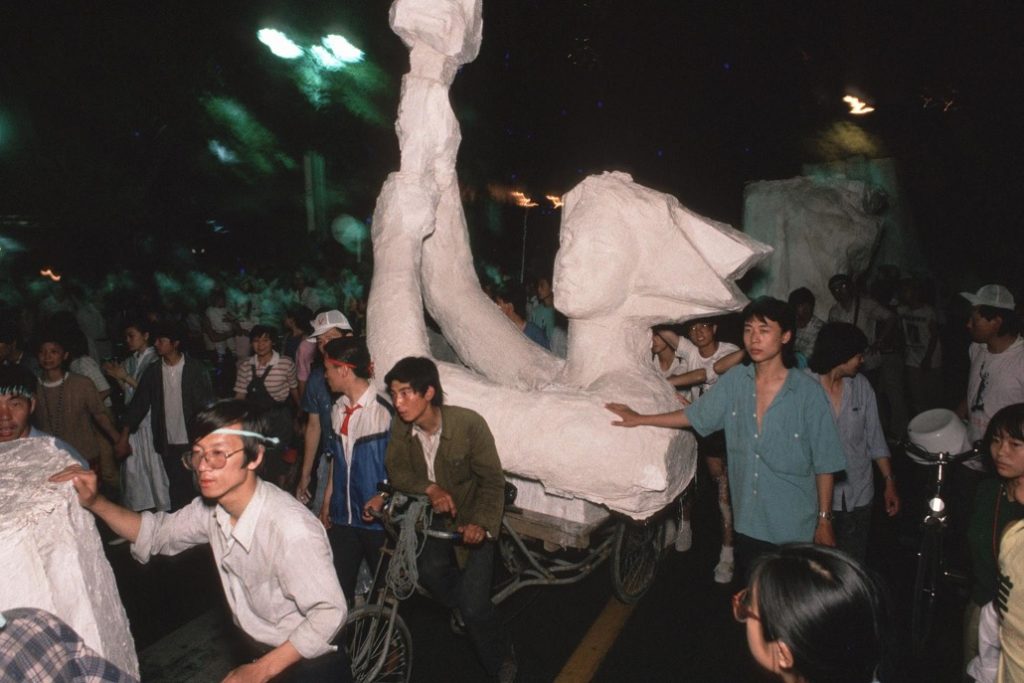
This piece was translated from Yibao Chinese. If republished, please be sure to add the source and link https://www.yibao.net/?p=247813&preview=true before the text when reposting.
The views of the author do not necessarily represent those of this journal.

